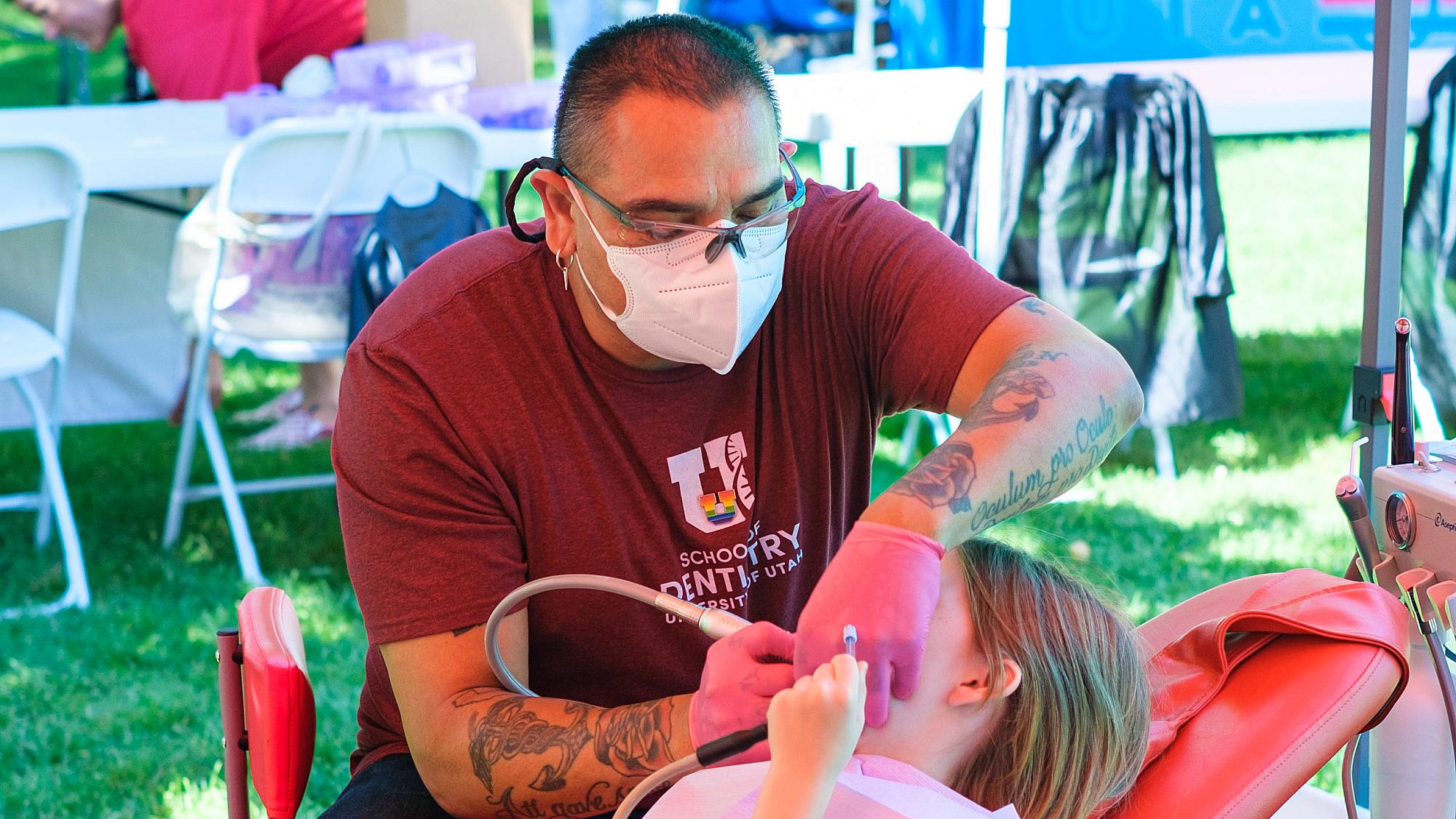

Since its inaugural class started in 2013, the University of Utah School of Dentistry (SOD) has undergone significant growth. Starting with a cohort of 20 students, the school has continuously expanded its reach and influence, now training a full cohort of 50 future dentists. These students along with the faculty and staff help further the School of Dentistry’s mission to "advance health by meeting the oral health needs of our community and making a meaningful impact on the health of our underserved."
The University of Utah School of Dentistry distinguishes itself from peer institutions by offering more extensive clinical training. Students begin treating patients a year earlier than they would in similar programs. As part of the community-centered mission, the DDS cohorts at the University of Utah provide care in clinics on campus and across the valley and state. The school, along with the support of hundreds of Associated Providers across the state, serves as Utah’s sole Medicaid dental provider, thanks to the state legislature’s expansion of the program. Because of this unique partnership, the patient population the school serves comes from all walks of life, providing students with the chance to learn how to serve diverse patient populations within their communities now and in the future. The students themselves also represent various communities and backgrounds, allowing the patients to see themselves and their experiences reflected through their care providers, which has been shown to strengthen the patient-provider relationship.
The dedication to the community-oriented mission, vision and values has led to the establishment and growth of partnerships with local schools and clinics. Dr. Heidi Iongi, director of community engagement and integrated clinics, has been a critical part of informing our surrounding communities about the services the School of Dentistry provides as part of collaborative efforts with places like South Main Clinic and Rose Park Clinic. These partnerships help seamlessly integrate dental care into existing visits with primary care providers. Care is also provided onsite at Liberty Elementary, decreasing the amount of time students miss class while keeping up with routine checkups and offering relief for parents for whom taking time off work for appointments can mean lost wages. Additional outreach efforts include working with a women's health clinic in Salt Lake City and serving patients in rural areas like Cedar City, St. George, Vernal and Wendover through its Mobile Dental Clinic.
The sense of belonging fostered in the School of Dentistry is vital to its continued success. With a small cohort size, students receive individualized attention from and connection to faculty and staff members, enabling them to thrive in their studies. To ensure understanding of the evolving needs of their students, faculty and staff, the SOD conducts regular climate surveys. New programming is being established to ensure that all, particularly those who have been historically underrepresented in dentistry, know that this is an educational and career opportunity open to people from every walk of life. The Public & Rural Expansive Conditional Acceptance Program (PRE-CAP), now in its second year, provides a multifaceted approach to set its students up for success in the long run. A Dental Admissions Preparatory Program (DAPP) launches next summer and will provide participants with tools for success as they apply to dental school. The School of Dentistry is also increasingly engaged with University of Utah Health Equity, Diversity, & Inclusion's Saturday Academy program, which creates an early connection for Utah students in grades four through 12 to the health sciences.
Commitment to oral health extends beyond the classroom and clinical practice, as evidenced by the research from the School of Dentistry. Glen Hanson, DDS, former SOD interim dean, was the lead author of a paper published in the Journal of the American Dental Association about the effect comprehensive oral care has on patients in substance use disorder (SUD) recovery programs. Hanson and co-authors, comprised of School of Dentistry faculty, students and partners, found that "integrated comprehensive oral health care of major dental problems significantly improves treatment outcomes in patients whose disorders are particularly difficult to manage, such as patients with SUDs." Brenda Heaton, PhD, MPH, the new associate dean for research, is building upon the foundation in SOD to create a burgeoning research enterprise.
The School of Dentistry's growth since its establishment just over a decade ago reflects its unwavering commitment to excellence, service and belonging. Under the visionary leadership of Dean Rory Hume, the school is quickly becoming a national model for incorporating innovation, compassion and community into dental education and care.
Special thanks to the following folks from the School of Dentistry for contributing their time and expertise to this piece:
- Carter Bruett, DDS, MEd, PRE-CAP Program Director
- Holly Sharp, DDS, Assistant Dean for Clinical Affairs
- Alex Steele, MBA, MSBA, Associate Director of Admissions
- Bart Watts, DDS, Associate Dean for Belonging and Student Affairs
Photograph: Steven Delsie, Greenwood Dental Clinic Manager, by Noah Jurik